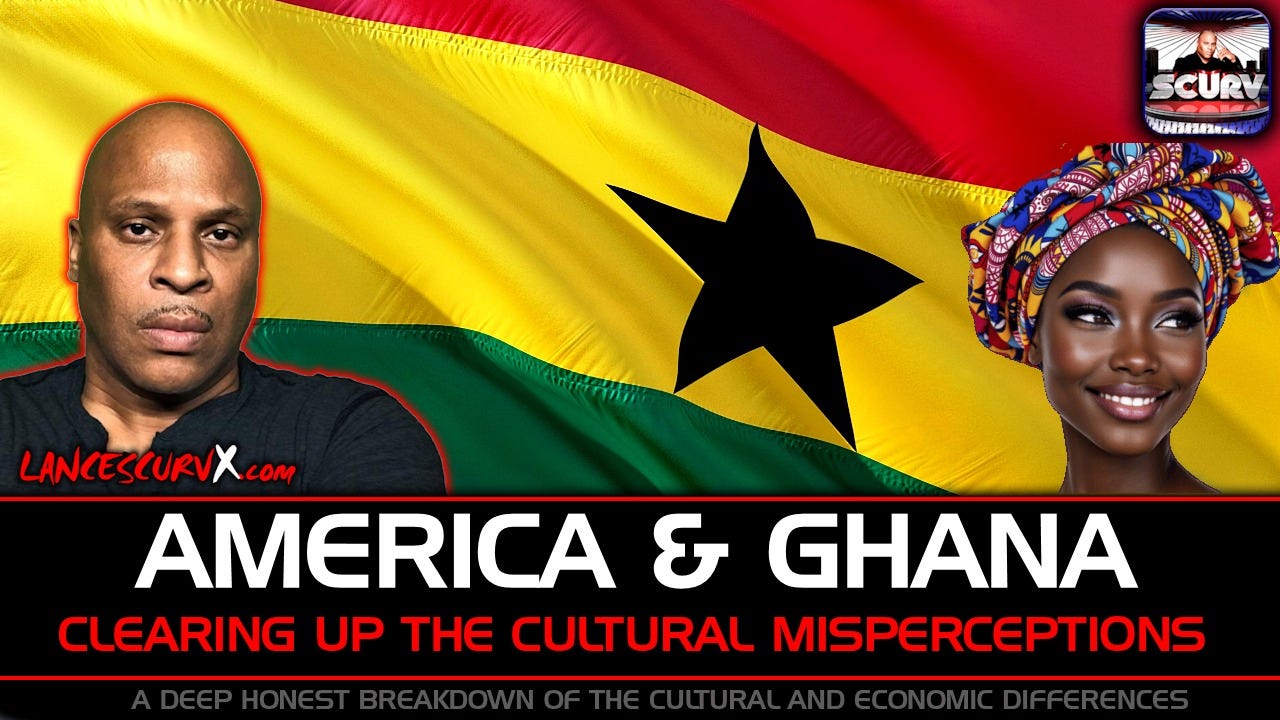There are moments in life when a man steps into a new land and instantly feels the shift in his spirit. Living in Ghana long enough will do that to you. It slows your pulse, stretches your patience, deepens your gratitude, and forces you to see the world — and America — with different eyes. When you’ve lived in both places long enough, you begin to understand that these are two very different worlds shaped by two very different histories, cultures, expectations, and spiritual rhythms.
And that is where the comparisons really begin.
Ghana and the United States look similar on paper: modern economies, busy cities, ambitious populations, and dreams of a better tomorrow. But once your feet hit the ground and you start living daily life, the differences scream louder than the similarities. These differences touch everything — how people see success, how families operate, how money circulates, how community works, and how stress eats away at people in America while Ghanaians seem to walk with a weightless spirit.
Below is the real breakdown — not from a tourist’s eyes, not from a superficial “expat” viewpoint — but from a Black man who has lived deeply in both worlds and sees the contrast with clarity.
1. Pace of Life and Stress Levels
In America, life moves at a speed designed to burn you out. People live in constant anxiety — rushing, grinding, performing, competing, chasing. In Ghana, the pace is human. Life breathes. People aren’t slaves to the clock. When someone says, “I’m coming,” it means they’ll arrive — but without the frantic panic. This slower rhythm keeps blood pressure down, allows patience to grow, and gives the mind space to heal from the high-pressure American way of living.
2. Community vs. Individualism
America is the land of “me.” Ghana is the land of “we.”
When something happens in Ghana, everybody knows, everybody checks in, and everybody helps. In the U.S., people walk past each other like ghosts. Isolation is normal. Depression thrives. The lack of community support system destroys many people emotionally and mentally. Ghana reminds you that humans are not meant to live alone inside boxes, working themselves to death.
3. Family Structure
In the U.S., families have become fragmented, distant, and emotionally disconnected. Ghanaian families remain interconnected, supportive, and deeply rooted. Elders are respected, not discarded. Children grow up surrounded by guidance, not screens. The family here is not a burden — it is a source of strength.
4. Relationship Expectations
In the United States, relationships are built around independence, personal convenience, money, and emotional triggers. Ghanaian relationships tend to prioritize stability, duty, partnership, and long-term goals. There is less transactional energy, less competition between partners, and more emphasis on building a household that works.
5. Materialism and Wealth Signaling
America teaches you to prove your worth through things: cars, brand names, gadgets, debt masquerading as “success.”
Ghana teaches you that wealth is peace, land, family, and being grounded in your own identity. People are not running around trying to look rich. They are trying to live meaningfully.
6. Spirituality
In America, spirituality is either commercialized or abandoned. In Ghana, it is the heartbeat of daily life. Prayer is natural. Belief in a higher power shapes behavior. People turn to God before they turn to medication or alcohol. There is a spiritual foundation that America has long lost.
7. Money Mindset
Americans spend money before they make it. Ghanaians stretch what they have, plan long term, and build slowly. America normalizes debt. Ghana normalizes patience.
8. Food Culture
In America, processed food dominates. Fast food is survival. Health breaks down early.
In Ghana, food is fresh, grown from the soil, cooked slowly, and eaten with intention. You taste the earth, not chemicals. Your body feels the difference.
9. Respect and Manners
Ghana has a respect culture. Elders are greeted. Strangers are acknowledged. Titles matter. In America, disrespect has become casual. People talk to elders like peers. Children curse out parents. There is no reverence.
10. Crime and Safety
The U.S. is tense. Violence is normalized. Sirens are part of the soundscape.
Ghana is safer, calmer, and community-policed. People watch out for each other. You can walk at night without the same fear.
11. Work-Life Balance
Americans live to work. Ghanaians work to live.
This simple inversion explains why Americans are exhausted and Ghanaians seem to age slower.
12. Economic Pressure
Rent, taxes, insurance, medical bills, fees, fines — America bleeds you dry from every direction.
Ghana has challenges, but the day-to-day cost of simply being alive is so much lighter. Breathing doesn’t cost money.
13. Stress Aging
In America, people age ten years for every five. Stress is etched into faces.
In Ghana, even elders move with softness. The sun, the food, the slower pace — it all adds up to more life in your years.
14. Mental Health
In the U.S. depression and anxiety spread like wildfire. Social media, bills, loneliness, and pressure eat people alive.
In Ghana, mental health issues exist, but the environment is healing, not triggering.
15. Identity and Self-Worth
In America, Black people are always fighting to prove themselves, fit in, maneuver around racism, and survive psychological attacks.
In Ghana, you are simply you — Blackness is the norm. There is relief, pride, and identity without apology.
MY FINAL THOUGHTS
Living in both Ghana and America teaches you that the “American Dream” is often a nightmare dressed up nicely. Once you experience a culture that lets you breathe, you realize how abnormal the U.S. stress culture really is. Ghana gives you back your time, your peace, and your humanity.
There is something healing about being surrounded by your own people — not fighting for acceptance, not code-switching, not adjusting your identity every time you walk out of the house. Ghana removes that psychological weight completely. You begin to understand what true freedom feels like.
Every Black person in America should at least visit Africa once, even if they don’t plan to move. The lesson is not about choosing one country over another — it is about seeing life through a different lens. When you compare the two worlds, you realize how many things America normalizes that are actually harmful to your health, your spirit, and your sanity.
Ghana is not perfect. No place is. But it gives you something priceless: balance. You may earn less but live more. You may not have as many gadgets, but you will have more peace. You may move slower, but you move with purpose.
And once you taste a life that feeds your soul, you will never again settle for a life that only drains it.













